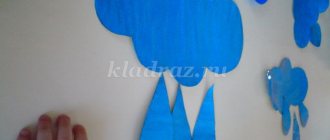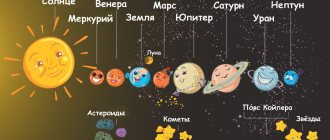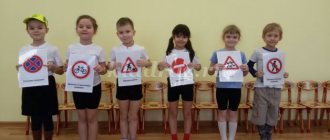Project for February 23 in kindergarten. Senior group
Project on the theme “Our Motherland.
Our Army. Symbolism" for children of senior preschool age. Relevance: We live in the Russian Federation. This is our common Motherland. We all need to make every effort to ensure that Russia develops and moves forward. Love for one's Fatherland presupposes self-sacrifice. Children need to understand that they need to take care of themselves, study a lot, be useful and help their loved ones, kindergarten, city, and ultimately the country. So that our people can live and work in peace in the country, our army and navy exist. Their responsibility is to protect our Motherland. Every defender from kindergarten must cultivate in himself such qualities of a Russian warrior as strength, dexterity, hard work, honesty, courage, the ability to protect the weak... Our army serves under the flag of Russia, which is the symbol of the state. State symbols also include the anthem and coat of arms, which children begin to become familiar with from an early age. Project type: informational and educational. Duration of the project: short-term Project participants: children of the senior speech therapy group, teachers, parents. The goal of the project: to develop children’s ideas about Russia, its historical development, and to give an idea of the Russian army. Project objectives: - expand children’s knowledge about Russia, the army, introduce them to the holiday of February 23 and its history. - cultivate love for the Motherland, respect the national and cultural traditions of the people. - develop courage, strength, and will in boys. - to bring pride to our country. — give an idea of the structure of the Armed Forces and state symbols. Expected result: - increasing children's knowledge about the Motherland, the Russian army and symbols; — development of patriotic feelings in preschoolers. Stages of work: I. Preparatory
- defining goals and objectives;
— selection of literature on the topic; — selection and acquisition of teaching materials and equipment; — planning joint activities. II. Basic Physical development Objectives:
- develop sports qualities: agility, courage, endurance;
- develop a sense of collectivism; - develop the ability to navigate in space. GCD:
- relay race “Brave pilots”, “Sharp shooters”, “Ride on horseback”;
- practice throwing, long jumping; - outdoor game “Border Defense”. Social and communicative development Objectives:
- to form children’s ideas about the defenders of our Motherland;
- cultivate a sense of pride in your country and army; - arouse children's interest in the past; — introduce children to the symbols of our Motherland. GCD:
- conversations “Our Army”, “Conversation about courage and bravery”, “Symbols of Russia”;
— observation “Where we meet the Russian flag, coat of arms, anthem”; — role-playing game “Border Guard”, “Sailors”, “Military Town”, “Scouts”; Cognitive development Objectives:
- to form in the child a sense of pride in his state, its great and glorious historical past, as well as the huge potential for its development in the future.
- give the basics of history: main historical milestones, major historical events. — introduce children to the basics of geography: the capital of our Motherland, rivers, climate, nature. NOD:
- conversation: “Our Motherland is Russia”, “I am a future soldier”;
— examination of illustrations, albums of the Russian Army “Branches of Troops”; — D/i: “Whose uniform?”, “Military equipment”, “Costumes of the people of Russia”, “Find the flag, coat of arms of your country”; — viewing slides on the topic. Speech development Objectives:
- continue to teach children to correctly perceive the content of the text and answer questions;
- develop general speech skills, coordination of speech with movement; - learn to compose a descriptive story using a reference table. GCD:
- conversations about military professions, about the Motherland.
— learn finger gymnastics “Our Army”; — D/i: “Who is doing what?”, “What troops”; - reading poems about military professions; - solving riddles. Artistic and aesthetic development Objectives:
- to introduce preschoolers to the features of the military profession;
— teach children to sculpt military equipment; - develop the ability to correctly position an image on a sheet of paper; - cultivate interest and love for books. GCD:
- examination of illustrations, books on the topic;
— modeling “Military equipment”; — drawing “Dad in the Army”; — application “Army symbols”; - reading: M. Matusovsky “Where the Motherland Begins”, K. Ushinsky “Our Fatherland”, J. Dlugolentsky “What Soldiers Can Do”; — learning the text of the Russian anthem. III.
Final - making gifts with children for the holiday “Defender of the Fatherland Day”; - holding entertainment “Come on Dad”; — design of the photo exhibition “Dad in the Army”; — viewing the presentation.
We recommend watching:
Defender of the Fatherland Day - February 23 in the senior group. Scenario Scenario for the holiday on February 23 for kindergarten. Senior - preparatory group Scenario for a sports festival on February 23 for children in the senior group Scenario for a sports festival on February 23 for children in the senior group. Dad, mom, I am a sports woman
Similar articles:
February 23 in kindergarten
KVN for February 23 in kindergarten in the preparatory group
Scenarios for February 23 in kindergarten for the older group
Conversation in kindergarten in the senior group on the topic: February 23
Section 2. Modern defenders of the Fatherland.
Ask your child - who is protecting us now and protecting us from enemies?
Very often, children have very distant ideas about the army and soldiers, although they often hear these words from us and encounter them in stories and films.
Let me give you an example of my dialogue with the kids in class:
-Who protects us on earth?
Children: Border guards, tank crews, infantrymen.
-Who protects us in the sky?
Children: rocket scientists, pilots.
— Our country is a maritime power. Who protects our country's maritime borders?
Children: ducks and geese!
Or: “I want to join the army - it’s fun there. Soldiers march, songs are sung, drums are played. I also want to play the drum. When I grow up, I will join the army."
And such an inaccurate idea of children about our modern defenders and the army is due to the fact that children see films only about war, but they do not have the opportunity to see clearly what soldiers do in peacetime.
And so we will now correct this situation and take a video tour to the military unit to see real soldiers.
Children about the defenders of the Fatherland: educational video for classes.
Watch with your children this wonderful and very interesting educational video for children of senior preschool and primary school age about our modern defenders.
Together with the Brave Soldier, children will go on an excursion to a military unit and learn:
- who are the soldiers,
- what is the army and what do they do in it,
— what is a charter,
- what do soldiers do?
- where do they live,
- how soldiers learn and understand military affairs,
- what soldiers do in their free time and many other facts about our defenders.
Better to see once than hear a hundred times! Enjoy watching!
Read poems to children about our defenders - soldiers, sailors. And about what PROTECTION is not only in big things, but also in small things - in our everyday life.



